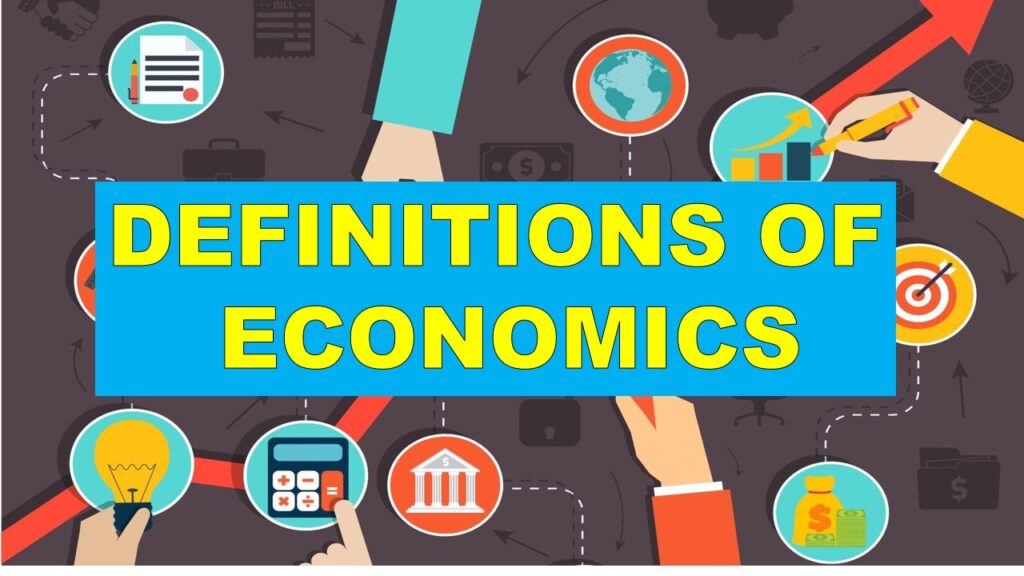The beginning of the definition of economics is considered to be from Adam Smith book ‘An Inquiry into the Nature and Causes of Wealth of Nations‘ (1776). But we should not understand that the form of economics that came before us in 1776 is only the result of the efforts of Adam Smith. Much had been written about economic activities even before Adam Smith. Yes, Adam Smith gave a systematic and scientific form to economics. That is why he is called the father of economics.
अर्थशास्त्र की परिभाषा की शुरुआत एडम स्मिथ की किताब ‘एन इंक्वायरी इन द नेचर एंड कॉज ऑफ वेल्थ ऑफ नेशंस’ (1776) से मानी जाती है। लेकिन हमें यह नहीं समझना चाहिए कि 1776 में अर्थशास्त्र का जो रूप हमारे सामने आया वह केवल एडम स्मिथ के प्रयासों का परिणाम है। एडम स्मिथ से पहले भी आर्थिक गतिविधियों के बारे में बहुत कुछ लिखा जा चुका था। हाँ, एडम स्मिथ ने अर्थशास्त्र को एक व्यवस्थित और वैज्ञानिक रूप दिया। इसलिए उन्हें अर्थशास्त्र का जनक कहा जाता है।
Contents
- 1 WEALTH DEFINITIONS
- 1.1 1. Classical Definition (Wealth-Oriented)
- 1.2 2. Welfare Definition
- 1.3 3. Scarcity Definition
- 1.4 4. Growth-Oriented Definition
- 1.5 In Simple Words:
- 1.6 Two Main Branches of Economics:
- 1.7 FUNDAMENTALS OF ECONOMICS AND MANAGEMENT
- 1.8 DEFINITIONS OF ECONOMICS
- 1.9 Definition of Economics
- 1.10 EC-101 Economics.pdf
CLASSIFICATION OF DEFINITION OF ECONOMICS
The classification of the definition of economics is as follows
1. Money Definitions : (Adam Smith, J.B.S., J.S. Mill, etc.)
2. Welfare Definitions : (Marshal, Pigu, Cannon, etc.)
3. Definition of Rarity : (Prof. Robins)
4. Definition of Deletion of Desire : (Prof. J.K. Mehta)
5. Developmental Definition : (Samuelson)
अर्थशास्त्र की परिभाषा का वर्गीकरण
अर्थशास्त्र की परिभाषा का वर्गीकरण इस प्रकार है
1. धन परिभाषाएँ: (एडम स्मिथ, जे.बी.एस., जे.एस. मिल, आदि)
2. कल्याण परिभाषाएँ: (मार्शल, पिगू, तोप, आदि)
3. दुर्लभता की परिभाषा : (प्रो. रॉबिन्स)
4. डिजायर ऑफ डिजायर की परिभाषा : (प्रो. जे.के. मेहता)
5. विकासात्मक परिभाषा : (सैमुअलसन)
WEALTH DEFINITIONS
Money definitions and their interpretations
Economists in this group defined economics as the ‘science of wealth’. Adam Smith (Adam Smith) named the first book of economics ‘The Pursuit of The Nature and Causes of Nation’s Wealth’ ‘An Enquiry into the Nature and Causes of Wealth of Nations‘. This title of his book is a definition of economics in itself. Adam Smith’s definition of economics can be expressed in the words: “Economics is the study that examines the nature of nations’ wealth and its causes. We can also express the essence of the definition of economics given by Adam Smith in the words “Economics is the science of wealth” (“Economics is the Science of Wealth“).” Thus, it is clear from Smith’s statement that the duty of economics and economists is to explain the measures that can increase wealth in the society.
इस समूह के अर्थशास्त्रियों ने अर्थशास्त्र को ‘धन के विज्ञान’ के रूप में परिभाषित किया। एडम स्मिथ (एडम स्मिथ) ने अर्थशास्त्र की पहली पुस्तक का नाम ‘द परस्यूट ऑफ द नेचर एंड कॉज ऑफ नेशन्स वेल्थ’ ‘एन इंक्वायरी इन द नेचर एंड कॉज ऑफ वेल्थ ऑफ नेशंस’ रखा। उनकी पुस्तक का यह शीर्षक अपने आप में अर्थशास्त्र की एक परिभाषा है। एडम स्मिथ की अर्थशास्त्र की परिभाषा को शब्दों में व्यक्त किया जा सकता है: “अर्थशास्त्र वह अध्ययन है जो राष्ट्रों के धन की प्रकृति और उसके कारणों की जांच करता है। हम एडम स्मिथ द्वारा दी गई अर्थशास्त्र की परिभाषा का सार भी शब्दों में व्यक्त कर सकते हैं” अर्थशास्त्र है धन का विज्ञान” (“अर्थशास्त्र धन का विज्ञान है”)।” इस प्रकार स्मिथ के कथन से स्पष्ट है कि अर्थशास्त्र और अर्थशास्त्रियों का कर्तव्य उन उपायों की व्याख्या करना है जिनसे समाज में धन की वृद्धि हो सकती है।
Here are the main definitions of Economics as given by various well-known economists, categorized by different schools of thought:
1. Classical Definition (Wealth-Oriented)
By: Adam Smith (1776)
“Economics is an inquiry into the nature and causes of the wealth of nations.”
Focus: Production and accumulation of wealth
Nickname: Father of Economics
Book: “An Inquiry into the Nature and Causes of the Wealth of Nations”
Criticism: Too narrow, ignores welfare and human aspects.
2. Welfare Definition
By: Alfred Marshall (1890)
“Economics is a study of mankind in the ordinary business of life. It examines that part of individual and social action which is most closely connected with the attainment and use of material requisites of well-being.”
Focus: Human welfare and material well-being
Book: Principles of Economics
Criticism: Focuses only on material welfare, ignores non-material and scarce resources.
3. Scarcity Definition
By: Lionel Robbins (1932)
“Economics is the science which studies human behaviour as a relationship between ends and scarce means which have alternative uses.”
Focus: Scarcity and choice
Universal applicability (includes all human activities)
Criticism: Ignores welfare and moral values.
4. Growth-Oriented Definition
By: Paul A. Samuelson (Modern Economics)
“Economics is the study of how people and society choose, with or without the use of money, to employ scarce productive resources that could have alternative uses, to produce various commodities over time and distribute them for consumption.”
Focus: Economic growth, efficiency, and resource allocation over time
Combines scarcity + welfare + growth
In Simple Words:
Economics is the study of how individuals, businesses, and governments make choices on allocating resources to satisfy their needs and wants.
Two Main Branches of Economics:
| Branch | Description |
|---|---|
| Microeconomics | Study of individual units (consumers, firms) |
| Macroeconomics | Study of the economy as a whole (GDP, inflation) |
If you want a PDF format of this or visual summary for revision, I can create that too! Let me know

